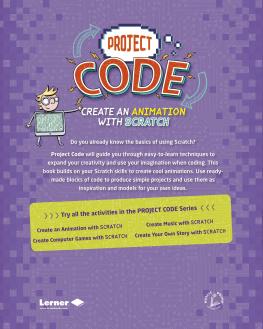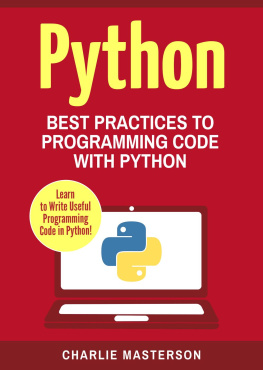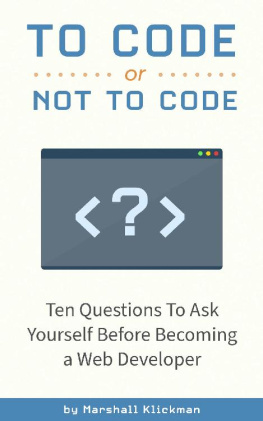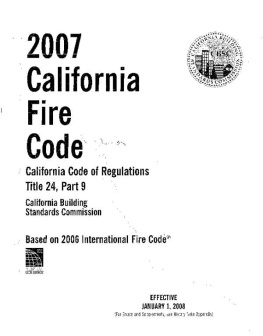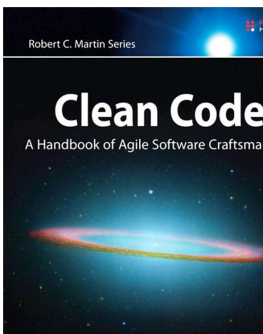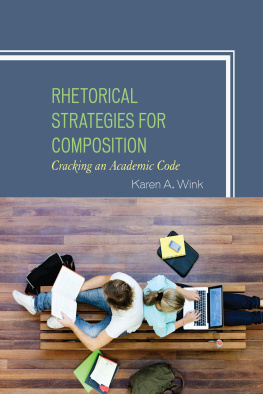Kevin Brock - Rhetorical Code Studies: Discovering Arguments In and Around Code
Here you can read online Kevin Brock - Rhetorical Code Studies: Discovering Arguments In and Around Code full text of the book (entire story) in english for free. Download pdf and epub, get meaning, cover and reviews about this ebook. publisher: University of Michigan Press, genre: Politics. Description of the work, (preface) as well as reviews are available. Best literature library LitArk.com created for fans of good reading and offers a wide selection of genres:
Romance novel
Science fiction
Adventure
Detective
Science
History
Home and family
Prose
Art
Politics
Computer
Non-fiction
Religion
Business
Children
Humor
Choose a favorite category and find really read worthwhile books. Enjoy immersion in the world of imagination, feel the emotions of the characters or learn something new for yourself, make an fascinating discovery.

- Book:Rhetorical Code Studies: Discovering Arguments In and Around Code
- Author:
- Publisher:University of Michigan Press
- Genre:
- Rating:3 / 5
- Favourites:Add to favourites
- Your mark:
- 60
- 1
- 2
- 3
- 4
- 5
Rhetorical Code Studies: Discovering Arguments In and Around Code: summary, description and annotation
We offer to read an annotation, description, summary or preface (depends on what the author of the book "Rhetorical Code Studies: Discovering Arguments In and Around Code" wrote himself). If you haven't found the necessary information about the book — write in the comments, we will try to find it.
Kevin Brock: author's other books
Who wrote Rhetorical Code Studies: Discovering Arguments In and Around Code? Find out the surname, the name of the author of the book and a list of all author's works by series.
Rhetorical Code Studies: Discovering Arguments In and Around Code — read online for free the complete book (whole text) full work
Below is the text of the book, divided by pages. System saving the place of the last page read, allows you to conveniently read the book "Rhetorical Code Studies: Discovering Arguments In and Around Code" online for free, without having to search again every time where you left off. Put a bookmark, and you can go to the page where you finished reading at any time.
Font size:
Interval:
Bookmark:
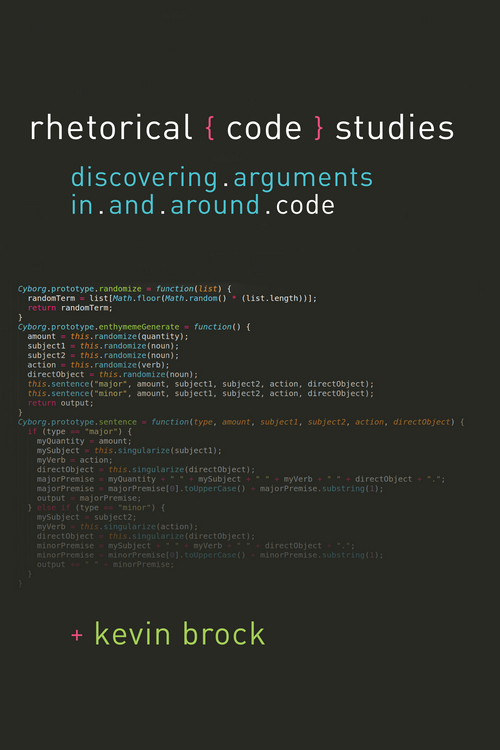
Page ii 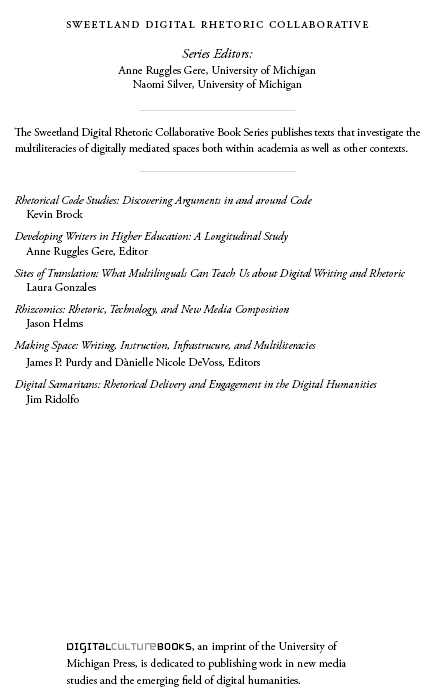
Kevin Brock
University of Michigan Press
Ann Arbor
Page iv Copyright 2019 by Kevin Brock
Some rights reserved

This work is licensed under a Creative Commons Attribution-ShareAlike 4.0 International License. Note to users: A Creative Commons license is only valid when it is applied by the person or entity that holds rights to the licensed work. Works may contain components (e.g., photographs, illustrations, or quotations) to which the rightsholder in the work cannot apply the license. It is ultimately your responsibility to independently evaluate the copyright status of any work or component part of a work you use, in light of your intended use. To view a copy of this license, visit http://creativecommons.org/licenses/by-sa/4.0/
Published in the United States of America by the
University of Michigan Press
Manufactured in the United States of America
A CIP catalog record for this book is available from the British Library.
Library of Congress Cataloging-in-Publication Data
Names: Brock, Kevin, author.
Title: Rhetorical code studies : discovering arguments in and around code / Kevin Brock.
Description: Ann Arbor : University of Michigan Press, [2019] | Series: Sweetland digital rhetoric collaborative series | Includes bibliographical references and index. |
Identifiers: LCCN 2018043066 (print) | LCCN 2018049477 (ebook) | ISBN 9780472131273 (hardcover : acid-free paper) | ISBN 9780472125005 (ebook) | ISBN 9780472901043 (OA)
Subjects: LCSH: Coding theory. | RhetoricData processing. | Software engineeringPsychological aspects. | Computer algorithmsPsychological aspects. | Online social networks.
Classification: LCC QA 268 (ebook) | LCC QA 268 . B 76 2019 (print) | DDC 005.13dc23
LC record available at https://lccn.loc.gov/2018043066
https://doi.org/10.3998/mpub.10019291
The publisher gratefully acknowledges the support of the Sweetland Center for Writing in making this book possible.
To Erin, my best friend and partner in all things.
Digital materials related to this title can be found on the Fulcrum platform via the following citable URL: https://doi.org/10.3998/mpub.10019291
This project, like so many of the cases discussed in the following pages, could not have been possible without myriad collaborators, colleagues, and mentors, all of whom have profoundly impacted my life through their assistance and friendship. I cannot overstate the gratitude I feel for all the time, energy, and consideration that has been shared with me. At the same time, I recognize my words here will be inadequate in acknowledging everyone who has helped me and in describing the impact they have had on me and this book.
I want to begin by offering my deepest thanks to Nancy Penrose, who took a chance on me when I was a struggling masters student who felt ambivalent toward writing and its study. At the time, I did not know just how significantly my life would change by turning my focus toward rhetoric and composition. Without Nancys support and patience with my gaining a grasp of the field, I would never have been able to pursue this career trajectory.
I also owe a considerable debt to the faculty with whom I studied in the Communication, Rhetoric, and Digital Media doctoral program at North Carolina State University; their guidance helped me develop the ideas central to my argument throughout this book. David M. Rieder offered invaluable and enthusiastic input throughout my time in the program. Alongside David, Susan Miller-Cochran, Jason Swarts, and Kenneth Zagacki all shared with me their incredible insight and feedback on my dissertation, which served as an early attempt at articulating my argument in this book. In addition, the courses I took with Carolyn R. Miller, Chris Anson, Susan Katz, Kelly Albada, David Berube, and Denise Gonzales Crisp helped me further refine the theories and methodologies informing my approach to communication, code, and software development.
While at North Carolina State, I was lucky to explore interdisciplinary inquiry alongside an excellent body of emerging scholars in the CRDM program, especially Jen Ware, Wendi Sierra, Dana Gierdowski, Robin Page viii Snead, Christopher Cummings, Lauren Clark, Seth Mulliken, Kati Fargo Ahern, Jordan Frith, Jason Kalin, David Gruber, Matt Morain, Dawn Shepherd, Kathy Oswald, Shayne Pepper, Ruffin Bailey, Kelly Norris Martin, Anna Turnage, Heidi von Ludewig, Ashley Rose Mehlenbacher, Kate Maddalena, Fernanda Duarte, Brent Simoneaux, Molly Hartzog, Jeff Swift, Elizabeth Johnson-Young, Keon Pettiway, Alex Monea, Elizabeth Pitts, Josh Reeves, and Gwendolynne Reid.
My colleagues at the University of South Carolina have been a source of tremendous intellectual and moral support. Byron Hawk, Hannah Rule, John Muckelbauer, Chris Holcomb, Christy Friend, Pat Gehrke, Gina Ercolini, Misty Fenske, and Erik Doxtader have guided me through this project and the balancing act that an early-stage academic career entails. Undergraduate and graduate students at South Carolina, in and out of the classroom, have also contributed to my crafting a fuller articulation of my arguments in this book. They include Gerald S. Jackson, Cynthia Bateman Jackson, Trevor C. Meyer, Adam S. Lerner, Ragan Glover-Rijkse, Ben Harley, Jonathan Maricle, Adam Padgett, Kelly L. Wheeler, Sebastian Ivy, Amber Lee, Ashley Walker, and Christian Smith. I am grateful to you all for allowing me to discuss my research with you during our time together.
Over the past decade, numerous colleagues from across the United States have graciously contributed to the continued development of my research. Jim Brown and Annette Vee have been mentors whose input greatly impacted more of my work than I could concisely describe, while Doug Eyman, Chris Lindgren, Estee Beck, Steve Holmes, Kristin Arola, Casey Boyle, Liz Losh, John Gallagher, Mark Marino, Cheryl Ball, Karl Stolley, Bill Hart-Davidson, Ryan Omizo, Brandee Easter, Collin Brooke, and Rachael Sullivan have all challenged me in productive ways to refine my arguments and explore new directions for the rhetorical study of software. I am grateful for their many thoughtful engagements with me. I also especially want to thank Matt Davis for the innumerable hours he spent reading and reviewing my drafts. This would be a much weaker book without his keen and considerate insight.
Naomi Silver, Anne Ruggles Gere, the members of the Sweetland Digital Rhetoric Collective editorial board, and Mary Francis and the University of Michigan Press provided me with insightful and compassionate support for this project and its publication. I am also greatly indebted to the reviewers who examined an initial draft of the manuscript, as their feedback guided my argument to evolve considerably and in ways I had Page ix not initially anticipated. I did not ever think I would enjoy so much working with a press.
Finally, I want to thank my patient friends and family for supporting my efforts and tolerating my distant- and absent-minded behavior while I worked, especially my wife Erin and my mother Cindy. David, Patrick, and Jim Brock were reliable sources of needed levity and distracting, although always informative, debate. My friends Jonathan, Adrianne, Gabriel, Scott, George, Pat, Dustin, and Ibrahim always made themselves available for whatever assistance they could provide. I dont know how you all have put up with me, but I will always adore you for it.
Next pageFont size:
Interval:
Bookmark:
Similar books «Rhetorical Code Studies: Discovering Arguments In and Around Code»
Look at similar books to Rhetorical Code Studies: Discovering Arguments In and Around Code. We have selected literature similar in name and meaning in the hope of providing readers with more options to find new, interesting, not yet read works.
Discussion, reviews of the book Rhetorical Code Studies: Discovering Arguments In and Around Code and just readers' own opinions. Leave your comments, write what you think about the work, its meaning or the main characters. Specify what exactly you liked and what you didn't like, and why you think so.

